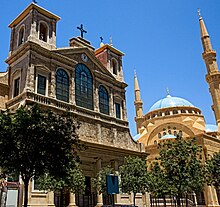
Back السياحة في لبنان Arabic گردشگری در لبنان Persian Pariwisata di Lebanon ID ლიბანის ტურიზმი Georgian Pelancongan di Lubnan Malay Turismo no Líbano Portuguese Туризм в Ливане Russian Lübnan'da turizm Turkish
| Economy of Lebanon |
|---|
 |
| Overview |
| Other topics |


The tourism industry in Lebanon has been important to the local economy historically and comprises a major source of revenue for the country.
From Stone Age settlements to Phoenician city-states, Roman temples to rock-cut hermitages, Crusader castles to Mamluk mosques and Ottoman hammams, the country's many historical landmarks and archaeological sites reflect thousands of years of world history.[1] In addition to physical attractions, Lebanon has a long-standing history of cultural tourism. Outsider interest in Lebanese culture was especially stirred following the visits of many European orientalists, scholars, and poets, particularly Alphonse de Lamartine, Ernest Renan, and Victor Guérin.[2][3] Prior to the Lebanese Civil War, Lebanon was regarded as "The Switzerland of the Middle East",[4] and Beirut was referred to as "The Paris of the Middle East",[5][6][7] renowned as a financial and business hub.
Significant private investment is currently being made in the modernization and expansion of the tourism sector, such as in hotels catering to international travelers. Casino du Liban, which historically constituted a major tourist destination, reopened in 1996.[citation needed] The largest ski resort in the country has been expanded and modernized. Lebanon's tourism industry also relies on the large number of Lebanese living abroad, who return regularly to the country during the summer season.[8]

- ^ Explore Culture & History in Lebanon. Retrieved on 15 June 2008 Archived 16 June 2008 at the Wayback Machine
- ^ "informations sur le Liban et le proche-orient - citations". Le journal des amis du Liban dans le monde. 7 June 2008. Retrieved 2008-06-08.
- ^ "Byblos (Lebanon)". About.com. Archived from the original on 2011-06-11. Retrieved 2008-06-08.
- ^ Nisan, Mordechai (2002-09-06). Minorities in the Middle East: A History of Struggle and Self-Expression, 2d ed. McFarland. ISBN 978-0-7864-1375-1.
- ^ Moussawi, Ghassan (2013). "Queering Beirut, the 'Paris of the Middle East': fractal Orientalism and essentialized masculinities in contemporary gay travelogues". Gender, Place & Culture. 20 (7): 858–875. doi:10.1080/0966369X.2012.753586. ISSN 0966-369X. S2CID 144168846.
- ^ Abramian, Jackie (4 August 2021). "A Year After The Blast, Paris Of The Middle East, Lebanon, Is An Economic, Political And Social Wreck". Forbes. Retrieved 2022-01-11.
- ^ Totten, Michael J. (2013). "Can Beirut Be Paris Again?". City Journal. Retrieved 2022-01-11.
- ^ "Profile of Lebanon : Economy". The US embassy in Lebanon Site. Archived from the original on 2013-09-08. Retrieved 2008-06-10.
© MMXXIII Rich X Search. We shall prevail. All rights reserved. Rich X Search